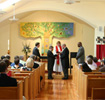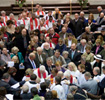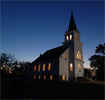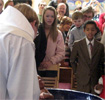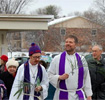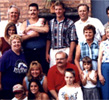
History, family and change
Rev. Daniel Ostercamp
Webster, S.D. "It's very much a sense of history, a sense of connection. To walk away from a church because you lost a vote is a very hard thing." |
↓ Interview
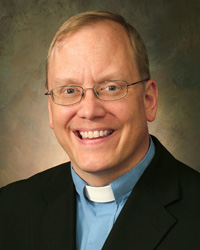 Rev. Daniel Ostercamp (Photo courtesy of Rev. Daniel Ostercamp) St. John's Lutheran Church in Webster, S.D. sits on Main Street, next door to other fixtures of small town life -- the city hall and the library -- and a block down from the post office. The church just celebrated its 125th anniversary. Five or more generations of families have worshiped here. It's a congregation of 800, in a town of 2,000. When the vote took place last August, the pastor, Daniel Ostercamp, was saddened and disappointed. He and much of his parish were strongly against the push to make gay pastors full clergy. But the traditions of the church ran too deep to be uprooted so quickly. "It's very much a sense of history, a sense of connection," he says. "To walk away from a church because you lost a vote is a very hard thing." "As much as Americans want to talk about being a people that travel, that move -- a mobile society," Ostercamp says, "a sense of place is still important. When you've been baptized in a congregation, your kids have been baptized here, and you were married here. That's where you've said your prayers, that's where you've sung your hymns," he says. "You've been in a sanctuary. And if there's a controversy that's forcing you to make a choice, that's very gut-wrenching." St. John's has not chosen to leave the ELCA. They've chosen instead to symbolically proclaim independence from the authority of the national ELCA through gestures such as withholding money ("benevolence," they call it) and giving it instead to the Lutheran church in South Dakota, or to local missions. He says he believes that "congregations are going to be more responsible for who they are, and that the synod and the national are going to have fewer and fewer resources and less and less influence, for better or for worse." |
Art Ellingsen
Gainesville, Fla. "Their failure to study the Bible is why, I believe the Lutheran Church has strayed so far from its roots." |
↓ In their words
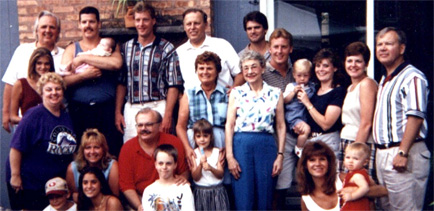 The Ellingsen Family reunion from the summer of 1995 in Chicago. (Photo courtesy of Art Ellingsen, pictured in the red shirt) Art Ellingsen of Gainesville, Fla. tells us that he split from the church in the early 1970's because even then he felt it was straying from its biblical basis. He sees the vote as another in a series of moves in that direction. "I pretty much left my home Lutheran Church in 1972 because the church I had been a part of my whole life was not teaching or preaching the truth from the Bible. "My home church is about 90 percent smaller than it was in 1972, so I'm not the only one who left to find churches which not only claim to follow Luther's teaching of Sola Scriptura but they actually do. While I was in high school (I graduated in '68), average Sunday morning attendance was between 1,500 and 2,000 for the two services including attendance at the children's services held downstairs. They claimed they had about 3,300 baptized members. On Christmas Eve and Good Friday they would have two services with about 750 people in each, packed in like sardines in a sanctuary built to hold about 600. "Last Christmas Eve I was there and only about 75 attended. "I moved to Florida five years ago so I don't get back there very often. I wonder if things would have been different had I stayed within the Lutheran Church. "I joined the Navy in '69 and went overseas on board ship during most of 1971 to Vietnam and Korea. I read the New Testament through cover to cover six times while I was gone. When I got back I had a long talk with my Lutheran pastor and I asked him all sorts of questions because what I had been reading in the Bible I never saw at his Lutheran church. Like prayer for the sick. "Out of 3,300 members there was only one Bible study for adults per week and only 10 attended. The only people who attended were those who were old and retired. My parents never attended one Bible study that I knew of. The Luther League studied the Bible but there wasn't a Bible study available for adults to attend if they wanted to. Their failure to study the Bible is why, I believe, the Lutheran Church has strayed so far from its roots." |
Roy Gulliford
Sarasota, Fla. "...this whole episode has been an embarrassment to the Church and our Biblical scholarship and theological tradition." |
↓ In their words
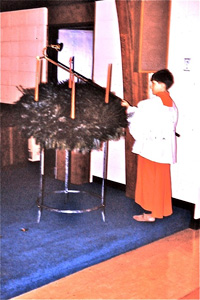 Brad Gulliford lights the Advent wreath. Brad is the gay son of a Lutheran pastor. (Photo courtesy of Roy Gulliford) Brad Gulliford is a Lutheran pastor. His son, Roy, is gay. Here, Brad and Roy share their experiences and struggles being connected to a church where homosexuals haven't been welcomed as full members of the community. "Brad is an only child-born in 1959. That was the year of my ordination. His mother, Marilyn had four Lutheran Pastors in her family. Brad had a number of birth defects that required more than 20 operations over 20 years. "Brad was always a top scholar who immediately connected with a Lutheran parish wherever he worked or went to school. At the beginning of grad school he came out -- no surprise to my wife and me since we had seen signs from early childhood. We had lengthy talks about this for though we loved him, we did have to wrestle with it all as did he. "However, we never doubted God's love of him and his place in the Church. I had always had colleagues who were gay and my only concern was: Are you a good and faithful pastor? When the ELCA started 'looking into bedroom windows,' I was appalled. Having served on Church vocations and examining committees, I knew we had approved gay persons for ordination and had never been sorry. This whole episode has been an embarrassment to the Church and our Biblical scholarship and theological tradition. This is from Brad Gulliford. Oppressed people grow old and die as the church takes its time; but this is really new ground for the human race, and there are no maps. The church must be judged (and forgiven by grace) for crushed and unfulfilled lives; but what it really has to be held accountable for is its stewardship of scholarship, tradition, and reason in how it approaches this development in humanity. Roy shares a story triggered by the votes and its aftermath. It was, he says , "one of the favorite moments of my life." "I was sitting at a cousin's (heterosexual) wedding reception, trying not to feel persecuted by a world that wouldn't afford me the same recognition if I were to commit to a permanent relationship with a man, and my uncle Eugene Kreider came over to talk with me. Now deceased, he was on the faculty of Luther Seminary at the time. "He described a union ceremony in the early to mid 1960's. As a pastor, he got to know a gay man, and in the days before Stonewall gay men knew shame and furtiveness, but my uncle ministered to this man's wholeness, and the man met someone with whom he could share joy and an island of security, however tiny and hidden; and one evening, in their apartment with the blinds drawn, my uncle witnessed their commitment (which they all had to keep a secret). "At my uncle's son's wedding, he thought it was important to share that with me. He then had to depart this life before seeing justice enacted in the church. To this day, my heart swells to think of it. My own flesh and blood was a pre-Stonewall hero! As long as we have people like that teaching our seminarians, our church of flawed humans will be all right." |
Judy Selmann
Kirkland, Wash. "...the decision of the ELCA convention last year have given us all hope that they and our grandson will grow up in a more inclusive and loving world." |
↓ In their own words
 The wedding of Judy Selmann and Pastor Dan Selmann on July 4, 1964. (Photo courtesy of Judy Selmann) Judy Selmann and her husband, Pastor Dan Selmann, have three kids, one of whom is a lesbian. For them, the vote has given them hope that their family will remain part of the church. "Our daughter, a lawyer, and her partner, a physician, had a commitment ceremony in our packed church (Bethesda Lutheran Church, Mountlake Terrace, Wash.) 12 years ago. "They are very active members of their Lutheran Church in Portland, Ore. where they were spontaneously cheered by the congregation when they brought their two-week old son to worship for the first time. They were legally married in Oregon and then the law was nullified. "The new decision of the California federal judge and the decision of the ELCA convention last year have given us all hope that they and our grandson will grow up in a more inclusive and loving world." |
In The Spotlight
-
The Current Music Blog
Your daily note for good music, news and pop culture. With attempted jokes.


